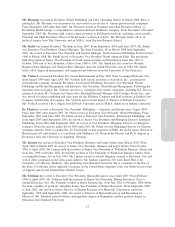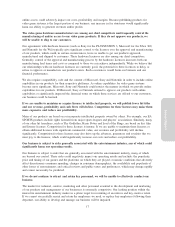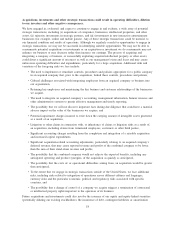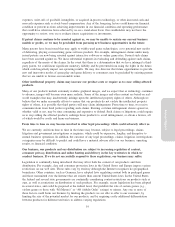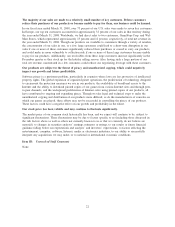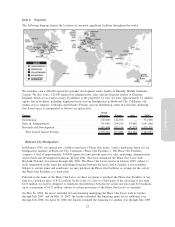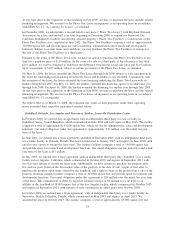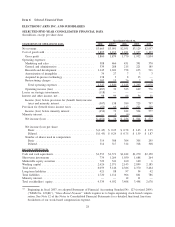Electronic Arts 2008 Annual Report Download - page 95
Download and view the complete annual report
Please find page 95 of the 2008 Electronic Arts annual report below. You can navigate through the pages in the report by either clicking on the pages listed below, or by using the keyword search tool below to find specific information within the annual report.
expenses, write-offs of goodwill, intangibles, or acquired in-process technology, or other increased cash and
non-cash expenses such as stock-based compensation. Any of the foregoing factors could harm our financial
condition or prevent us from achieving improvements in our financial condition and operating performance
that could have otherwise been achieved by us on a stand-alone basis. Our stockholders may not have the
opportunity to review, vote on or evaluate future acquisitions or investments.
If patent claims continue to be asserted against us, we may be unable to sustain our current business
models or profits, or we may be precluded from pursuing new business opportunities in the future.
Many patents have been issued that may apply to widely-used game technologies, or to potential new modes
of delivering, playing or monetizing game software products. For example, infringement claims under many
issued patents are now being asserted against interactive software or online game sites. Several such claims
have been asserted against us. We incur substantial expenses in evaluating and defending against such claims,
regardless of the merits of the claims. In the event that there is a determination that we have infringed a third-
party patent, we could incur significant monetary liability and be prevented from using the rights in the future,
which could negatively impact our operating results. We may also discover that future opportunities to provide
new and innovative modes of game play and game delivery to consumers may be precluded by existing patents
that we are unable to license on reasonable terms.
Other intellectual property claims may increase our product costs or require us to cease selling affected
products.
Many of our products include extremely realistic graphical images, and we expect that as technology continues
to advance, images will become even more realistic. Some of the images and other content are based on real-
world examples that may inadvertently infringe upon the intellectual property rights of others. Although we
believe that we make reasonable efforts to ensure that our products do not violate the intellectual property
rights of others, it is possible that third parties still may claim infringement. From time to time, we receive
communications from third parties regarding such claims. Existing or future infringement claims against us,
whether valid or not, may be time consuming and expensive to defend. Such claims or litigations could require
us to stop selling the affected products, redesign those products to avoid infringement, or obtain a license, all
of which would be costly and harm our business.
From time to time we may become involved in other legal proceedings which could adversely affect us.
We are currently, and from time to time in the future may become, subject to legal proceedings, claims,
litigation and government investigations or inquiries, which could be expensive, lengthy, and disruptive to
normal business operations. In addition, the outcome of any legal proceedings, claims, litigation, investigations
or inquiries may be difficult to predict and could have a material adverse effect on our business, operating
results, or financial condition.
Our business, our products and our distribution are subject to increasing regulation of content,
consumer privacy, distribution and online hosting and delivery in the key territories in which we
conduct business. If we do not successfully respond to these regulations, our business may suffer.
Legislation is continually being introduced that may affect both the content of our products and their
distribution. For example, data and consumer protection laws in the United States and Europe impose various
restrictions on our web sites. Those rules vary by territory although the Internet recognizes no geographical
boundaries. Other countries, such as Germany, have adopted laws regulating content both in packaged games
and those transmitted over the Internet that are stricter than current United States laws. In the United States,
the federal and several state governments are continually considering content restrictions on products such as
ours, as well as restrictions on distribution of such products. For example, recent legislation has been adopted
in several states, and could be proposed at the federal level, that prohibits the sale of certain games (e.g.,
violent games or those with “M (Mature)” or “AO (Adults Only)” ratings) to minors. Any one or more of
these factors could harm our business by limiting the products we are able to offer to our customers, by
limiting the size of the potential market for our products, and by requiring costly additional differentiation
between products for different territories to address varying regulations.
Annual Report
19






